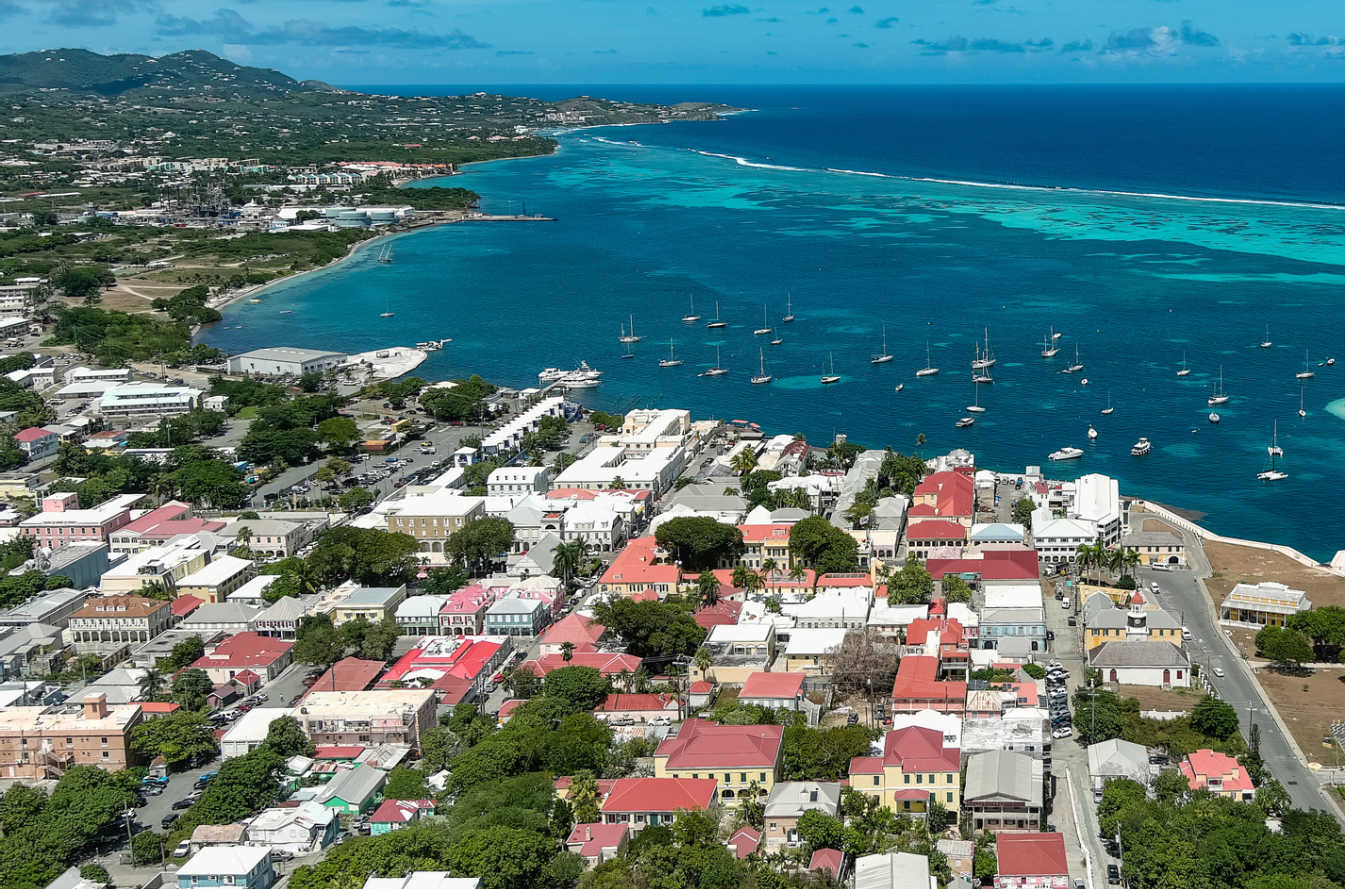Business
St. Croix’s Economic Boost: Zoning Requests for New Developments Spark Optimism

During a recent Committee of the Whole meeting, lawmakers showcased strong support for various zoning requests, with Senator Javan James expressing optimism about St. Croix’s economic prospects.
A notable proposal, Bill 35-0192, aims to transform Frederiksted properties between Prince Street and Hospital Street from R-4 to R-3 zoning. The current warehouse on Prince Street and the apartment complex on Hospital Street are slated for conversion into a hotel, augmenting the Fred Hotel’s presence. The Department of Planning and Natural Resources (DPNR) representative Jewel Polimis suggested a Business Central Business District (B1) rezoning for enhanced community benefit and stimulation of local property enhancements. Clarence Brown, representing the owners, assured that any renovations would align with the Historic Preservation Committee’s guidelines and would be undertaken in phases, commencing promptly. This initiative was welcomed by Senator Javan James, who was excited about Frederiksted’s development.
Additionally, legislators reviewed Bill 23-0213, filed by Positive T.A Nelson, proposing the rezoning of his Estate Morning Star property. The plan encompasses diverse activities, including social gatherings, outdoor concerts, and wellness services at the Serenity Nest venue. Initial neighborhood resistance, mainly concerning noise and security, was addressed and mitigated through discussions, as per Mr. Nelson. DPNR recommended a use variance with specific conditions like activity cessation by 2 am, installation of a 6 to 7-foot tall tree buffer, and maintaining a 25-foot distance from neighboring properties, which Nelson accepted gratefully.
Another discussion revolved around Bill 23-0214, concerning the rezoning of a parcel in Estate Glynn from agricultural to residential-medium density. The proposal involved constructing a 14-room guest house for diverse rental needs. Senators, including Alma Francis-Heyliger, expressed concerns about reducing agricultural land. DPNR’s Leia LaPlace Matthew clarified that the land could not be further subdivided due to current zoning requirements. Instead, a use variance was proposed, allowing for a group development without restricting short-term rentals. This variance would necessitate three separate buildings to accommodate the desired 14 units.
Senators Marvin Blyden and Novelle Francis raised questions about the project’s budget, highlighting discrepancies with typical construction costs in the region. They advised the applicants to prepare for potential cost escalations.
The final request of the day, Bill 35-0199, endorsed Governor Bryan’s approval for Joel Ureta to use submerged lands near Chenay Bay, St. Croix, for recreational purposes. This includes installing a mooring buoy, with an annual $500 fee to the Virgin Islands government. Mr. Ureta has previously received permissions for similar undertakings in the area.
These requests, while not immediately actionable by the Committee of the Whole, are set for consideration in the upcoming full body session, signaling a forward momentum in St. Croix’s economic and developmental landscape.
Business
The Rise of Eco-Friendly Businesses in the U.S. Virgin Islands

As the global focus on environmental sustainability continues to grow, the U.S. Virgin Islands has emerged as a hub for eco-friendly businesses. This shift reflects both local entrepreneurs’ commitment to preserving the islands’ natural beauty and the increasing demand from consumers for sustainable practices. From renewable energy solutions to sustainable tourism, the USVI is experiencing a green revolution that is reshaping its economy.
Sustainable Tourism: Leading the Way
Tourism is the backbone of the USVI economy, and the industry is undergoing a significant transformation. Many businesses are adopting eco-friendly practices to meet the growing demand for sustainable travel options. Hotels and resorts across the islands are implementing energy-efficient systems, reducing plastic waste, and sourcing local, organic produce for their restaurants.
For instance, some accommodations have integrated solar panels and water conservation systems, significantly reducing their environmental footprint. Additionally, eco-tours are becoming increasingly popular, offering visitors an opportunity to explore the islands’ pristine ecosystems while learning about conservation efforts. Kayak tours through mangrove forests and guided hikes through national parks are just a few examples of how tourism is being redefined in an eco-friendly context.
Renewable Energy: Powering the Future
Renewable energy is another sector where the USVI is making strides. With abundant sunshine and consistent trade winds, the islands are ideal for harnessing solar and wind energy. Several businesses and government initiatives are investing in renewable energy infrastructure to reduce dependency on imported fossil fuels.
One notable example is the push for solar energy installations across both residential and commercial properties. Solar farms are being developed to supply clean energy to the local grid, and many businesses are installing solar panels to power their operations. This shift not only reduces carbon emissions but also helps businesses save on energy costs, making them more competitive and sustainable.
Local Entrepreneurship and Innovation
Local entrepreneurs are at the forefront of the eco-friendly movement in the USVI. From organic farming to sustainable fashion, small businesses are driving innovation in various industries. These entrepreneurs are not only providing environmentally friendly products and services but also educating the community about the importance of sustainability.
For example, local farmers are embracing organic and regenerative farming practices, producing fresh, chemical-free produce for the local market. This approach not only benefits the environment by preserving soil health and reducing chemical runoff but also supports the local economy by reducing reliance on imported goods.
In the fashion industry, businesses are focusing on sustainable materials and ethical production processes. By sourcing materials locally and minimizing waste, these companies are setting new standards for the industry in the Caribbean.
Challenges and Opportunities
While the rise of eco-friendly businesses in the USVI is promising, it is not without challenges. The high initial costs of renewable energy installations and sustainable infrastructure can be a barrier for some businesses. Additionally, the small size of the local market can limit the scalability of these initiatives.
However, these challenges also present opportunities for innovation and collaboration. Partnerships between the private sector, government, and non-profits can help overcome these barriers by providing financial incentives, technical support, and public awareness campaigns. As global interest in sustainability grows, the USVI has the potential to attract eco-conscious tourists and investors, further fueling its green economy.
The Future of Eco-Friendly Businesses in the USVI
The future looks bright for eco-friendly businesses in the USVI. As more companies adopt sustainable practices, the islands are poised to become a model for green business in the Caribbean. The combination of natural resources, entrepreneurial spirit, and a commitment to preserving the environment creates a unique opportunity for the USVI to lead the way in sustainable development.
For businesses in the USVI, going green is not just a trend but a necessary evolution to meet the demands of a changing world. As the global emphasis on sustainability continues to grow, the USVI’s eco-friendly businesses will likely thrive, contributing to the islands’ long-term economic and environmental resilience.
In conclusion, the rise of eco-friendly businesses in the USVI is a testament to the region’s dedication to sustainability and innovation. As these businesses continue to grow and evolve, they will play a crucial role in shaping a sustainable future for the islands, ensuring that the USVI remains a beautiful and thriving destination for generations to come.
Business
Vivot Group Files for Bankruptcy Amid Financial Crisis, Lender Lawsuit

The Vivot Group of Companies, a prominent full-service commercial construction firm in the U.S. Virgin Islands, has filed for bankruptcy, according to court documents obtained by the Consortium.
Jean Patrick Vivot, president of the conglomerate, is requesting joint administration for the bankruptcies filed individually by each of the ten companies in the group. These companies include Vivot Equipment Corporation, Eleven Construction, PSI Tire Supply, Axis Development, TTA Logistics, Valdez Industrial Group, Caribbean Crane & Rigging, Vivot Industries Virgin Islands, Abacus International, and Vivot Equipment. The group collectively owns approximately $64 million worth of equipment, tools, and vehicles, alongside an additional $19 million in real property. However, they owe just over $56 million in secured debt, with the primary creditor being Touchmark National Bank of Georgia, to whom Vivot reportedly owes $31 million. The group also has a reported $13.5 million in unpaid taxes.
Mr. Vivot attributed the financial distress to the 2021 bankruptcy of Limetree Bay Services, which left the Vivot Group with $14.5 million in unpaid receivables. “Limetree’s liquidating bankruptcy, and its subsequent failure to pay the Limetree Receivables in full, caused the Vivot Group to endure significant financial and operational strain,” Mr. Vivot stated in his declaration. He further explained that a consensual out-of-court debt restructuring was deemed unfeasible after discussions with secured lenders.
Compounding the financial woes, Touchmark National Bank filed a lawsuit in early April, seeking to appoint a receiver for the Vivot Group. The lawsuit alleges that Vivot failed to repay debts and improperly reallocated assets designated as loan collateral. Touchmark claims that some equipment used as collateral was leased to third parties without consent, violating loan agreements.
The lawsuit details nine loans taken by Vivot companies between 2016 and 2019, with other group companies guaranteeing the loans and pledging all assets as collateral. Touchmark’s lawsuit reveals that a November 2023 spreadsheet indicated some collateral assets had been moved from St. Croix to other locations, including Puerto Rico and the mainland U.S. This movement and unauthorized leasing of equipment allegedly jeopardize the collateral’s value and hinder the bank’s ability to locate and liquidate it. Additionally, the bank asserts that Vivot violated loan agreements by allowing tax liens on properties used as collateral.
Touchmark has filed 95 complaints against the Vivot Group and Mr. Vivot, seeking a court judgment, the appointment of a receiver, and potential liquidation of collateral if the debtors fail to repay their obligations.
The bankruptcy filing temporarily halts Touchmark’s recovery efforts. Under Chapter 11 bankruptcy, the Vivot Group aims to reorganize its business, repay creditors over time, and continue operations. As “debtors-in-possession,” the group has requested court permission to use available cash for operating expenses.
For now, the Vivot Group is not in immediate danger of ceasing operations, but industry stakeholders are closely monitoring the situation as one of St. Croix’s largest construction service providers navigates its financial challenges.
Business
St. Croix Administrator Aims to Overturn New Trash Law Fines for Christiansted Business Owners

St. Croix Administrator Samuel Sanes is advocating for the rescission of fines levied against Christiansted business owners who were cited for violating a recently enforced trash law. These business owners claim they were unaware of the regulations. Mr. Sanes also seeks to engage with V.I. Waste Management Authority (WMA) officials to reconsider the enforcement strategies for this statute.
On May 23, WMA enforcement officers approached Christiansted business owners about their waste disposal methods. Upon learning that these businesses were using public trash receptacles, officers issued citations for violating VI Code Title 19, subsection 1563, which requires businesses to use the Anguilla Landfill or a commercial trash hauler. The sudden enforcement left many local business owners, including Maria Banwaree of Unique by Maria Banwaree Art Studio and Boutique, feeling distressed. Ms. Banwaree stated she was unaware of the law and felt coerced into signing the citations under threat of arrest. A week later, Mr. Sanes visited her store to personally apologize for the incident.
“He said in the name of the VI government he wants to apologize. He said that a couple of times. He says he feels so bad because we the people in Christiansted don’t need this,” Ms. Banwaree told this reporter. According to her, Mr. Sanes approached her following a meeting with WMA Executive Director Roger Merritt.
“I’ve spoken numerous times to the executive director for Waste Management, basically asking him to see if the charges can be dropped. I truly believe that a more comprehensive approach should have taken place. In other words, advise the business owners on the rules and regulations,” Mr. Sanes said.
Mr. Sanes noted the conflicting narratives—business owners claiming ignorance of the law, while WMA insists that a town hall meeting and other warnings were issued. He recommended to Mr. Merritt that all citations and fines be annulled, followed by a months-long informational campaign to ensure compliance among local businesses.
While proposing changes to the enforcement strategy, Mr. Sanes also questioned the practicality of the law, especially for very small businesses like Boardwalk vendors who generate minimal trash. “Are we going to demand that one vendor, which is a table, actually get a hauler, a trash hauler? For what, the possibility of a small bag of trash?” he asked. “It’s something that we really need to go back and explore.”
Mr. Sanes believes the law should be reconsidered, given the financial hardships Christiansted businesses have faced due to prolonged road repairs and closures. “It is a hardship for many small businesses at this time. So that’s one of the reasons why I approached Waste Management and I told them, let’s start all over again,” he said.
In response to her interaction with Mr. Sanes, Ms. Banwaree decided to collaborate with other nearby businesses to collectively engage a trash hauler. “We are organizing ourselves in advance, because we understand if we have information that we need to follow the law and follow the rules. But the thing is, they come before saying anything to us, just with the fine,” she said. She remains hopeful that the original fine will be reversed. “I hope that Mr. Sanes says the truth and I hope that the government really takes action,” Ms. Banwaree said.
In contrast, another business owner, Jan Mitchell of Mitchell Larsen Studio, who also received a citation and fine, was unaware of any efforts by Mr. Sanes to rescind the fines or any updates on the situation. “Maybe the whole thing will just pass and it’ll be fine with me. I hate making waves, I’m just not that kind of person, but I’m not going to not do anything if it calls for it. So we’ll see—it’ll play out,” she said.
As of press time, Mr. Merritt has not responded to numerous requests for comment, nor has WMA issued an official statement on the matter.
-

 Education8 months ago
Education8 months agoEducation Board Seeks Input on Schools Through Comprehensive Survey
-

 Education1 year ago
Education1 year agoCTE Board Enthusiastic About New Curriculum Standards, Yet Anxious Over Apprenticeship Support
-

 Crime1 year ago
Crime1 year agoRegistered Sex Offender Detained for Illegal Firearm Possession During Annual Surveillance Drive
-

 Development6 months ago
Development6 months agoCosts Surge as Donoe Estates Housing Project Resumes with New Contractor
-

 Crime1 year ago
Crime1 year agoSt. John’s Westin Resort Scene of Armed Robbery, Prompting Heightened Police Vigilance
-

 Videos2 years ago
Videos2 years ago2022 Gubernatorial Election: Voters Speak Out
-

 Videos2 years ago
Videos2 years agoGubernatorial Teams Celebrate St. Croix’s Bull & Bread Day
-

 Crime1 year ago
Crime1 year agoUnraveling the Home Invasion in St. John: Suspect Held on $100,000 Bail





